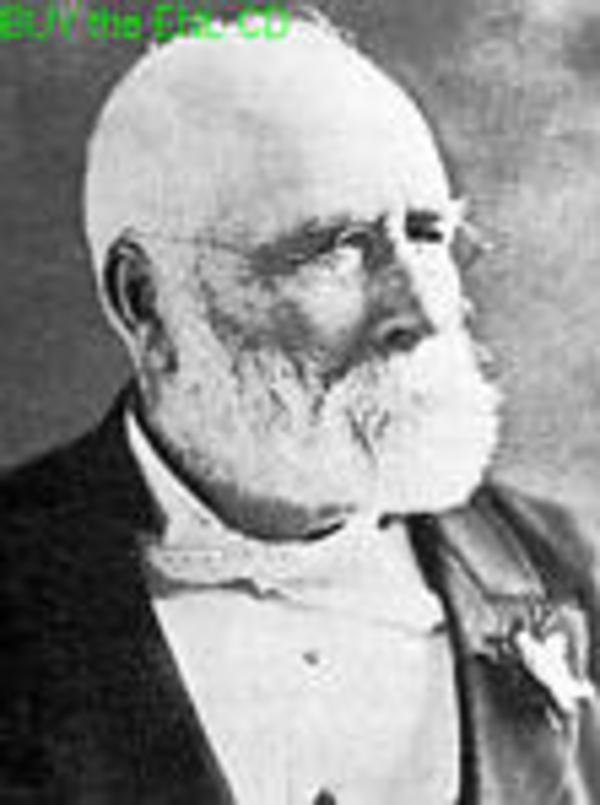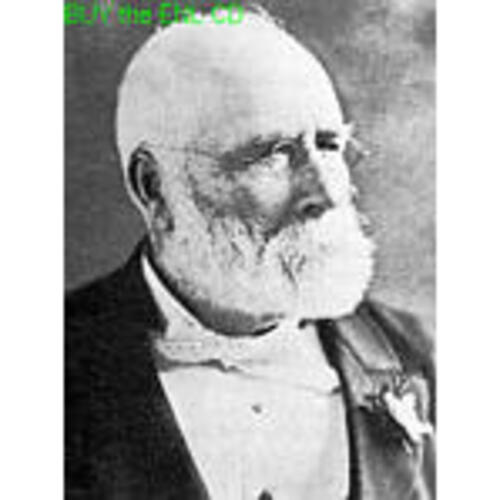
Source: Link
ROGERSON, JAMES JOHNSTONE, businessman, politician, and philanthropist; b. 21 March 1820 in Harbour Grace, Nfld, eldest son of Peter Rogerson and Amelia Palmer; m. first 21 Jan. 1845 Emma Garrett Blaikie (d. 1878) in St John’s, and they had three sons and four daughters; m. secondly 1879 Isabella Whiteford; they had no children; d. 17 Oct. 1907 in St John’s.
James J. Rogerson was the descendant of a Scottish family of some prominence in Johnstonebridge, Dumfriesshire. His grandfather, a Greenock merchant, is found in the Newfoundland records at least as early as 1803. Peter Rogerson became a permanent resident of Harbour Grace in 1817 and soon married a local girl. He was a pew holder, “though a dissenter,” in the Church of England, and one of the small but influential group of Scottish-born merchants in the colony, whose involvement was chiefly in the supply of manufactured goods exchanged for the produce of the fisheries.
After a good education at the Harbour Grace grammar school, James Rogerson was apprenticed at the age of 13 to the Scottish house of Green and Hunter in St John’s and then served with the old firm of J. and W. Stewart and Company. In 1841 he joined his father in the St John’s-based Peter Rogerson and Son, which had a number of vessels engaged seasonally in the seal fishery but was principally in general trade. The firm imported cargoes from Liverpool, England, salt from Cadiz, Spain, coal from Sydney, N.S., lumber from Halifax and Prince Edward Island, and flour from New York, and carried Methodist missionaries to Newfoundland free of charge [see James Dove]. It exported salt and pickled fish, seal skins and oil, and the like. Later Rogerson was to expend his entrepreneurial talents in the encouragement of local enterprises: agriculture, mineral exploration in association with Stephen Rendell*, John Steer, Edward White*, and others, and the establishment of a foundry and a boot and shoe factory.
In the 1840s, recently married to the daughter of the Scottish-born magistrate James Blaikie and beginning to raise what would be a large family, Rogerson first appeared prominently in the public life of the colony. He was an early member of the Newfoundland Natives’ Society, founded to secure the advancement of native-born residents in the era of representative government. In 1850 he was appointed to the Legislative Council and eight years later to the Executive Council as a representative of mercantile and Methodist interests. With Ambrose Shea he stood for the Liberal party in Burin district in the general election of 1859, and they were returned after a hard-fought contest. Rogerson was not a candidate in several subsequent campaigns, but in April 1870, at the by-election made necessary by the appointment of John Bemister* as sheriff of the Northern District, he was chosen mha for Bay de Verde. Re-elected in 1873, 1874, and 1878, he served as receiver general in the administrations of Frederic Bowker Terrington Carter* and Sir William Vallance Whiteway between 1874 and 1882. During the election in the latter year Rogerson emerged as a leader of the New party, a group of individuals dissatisfied with the Whiteway administration, particularly its railway-building policy. Like most of the New party candidates, he was defeated. On his retirement from political life he had bestowed upon him the title “Honourable” in recognition of a public career of probity and distinction.
With a son, William, now experienced in the family business, Rogerson was increasingly able to direct his prodigious energy to philanthropic work, for which he and his second wife, Isabella Whiteford, were held in uncommon regard by contemporaries. He was active, as always, in Methodist affairs and in the Temperance Society, whose journal he edited. With Isabella he was involved in the creation of a fishermen’s and sailors’ home and an agency to give employment to jobless workers in winter, and in the education of poor children, the provision of teachers for juvenile youths incarcerated in the penitentiary at St John’s, and the distribution of books and magazines to advance literacy in the most remote out-harbours of the colony. The vivid remembrance by his contemporaries on his death at age 87 was of “a life of unbounded charity and benevolence.”
General Protestant Cemetery (St John’s), Tombstone inscription. Maritime Hist. Arch., Memorial Univ. of Nfld (St John’s), Keith Matthews coll., ser.I, Rogerson name file. Evening Telegram (St John’s), 18 Oct. 1907 (obit. notice by D. W. P. [Daniel Woodley Prowse*]). Royal Gazette and Newfoundland Advertiser, 28 Jan. 1845. The book of Newfoundland, ed. J. R. Smallwood et al. (6v., St John’s, 1937–75). P. K. Devine, Ye olde St. John’s, 1750–1936 (St John’s, 1936). Encyclopedia of Nfld (Smallwood et al.), 1: 679–749. G. E. Gunn, The political history of Newfoundland, 1832–1864 (Toronto, 1966). J. [K.] Hiller, “The railway and local politics in Newfoundland, 1870–1901,” Nfld in 19th and 20th centuries (Hiller and Neary), 123–47. K[eith] Matthews, Lectures on the history of Newfoundland, 1500–1830 (St John’s, 1988), esp. 163–65. Methodist Monthly Greeting (St John’s), November 1907 (obit. notices by James Dove, who preached Rogerson’s funeral oration, and Charles Hackett). Nfld men (Mott). R. E. Ommer, “The Scots in Newfoundland,” Nfld Quarterly, 77 (1981–82), no.4: 23–31. Paul O’Neill, The story of St. John’s, Newfoundland (2v., Erin, Ont., 1975–76), 2. Prowse, Hist. of Nfld (1895). G. M. Story, George Street Church, 1873–1973 (St John’s, 1973).
Cite This Article
G. M. Story, “ROGERSON, JAMES JOHNSTONE,” in Dictionary of Canadian Biography, vol. 13, University of Toronto/Université Laval, 2003–, accessed March 30, 2025, https://www.biographi.ca/en/bio/rogerson_james_johnstone_13E.html.
The citation above shows the format for footnotes and endnotes according to the Chicago manual of style (16th edition). Information to be used in other citation formats:
| Permalink: | https://www.biographi.ca/en/bio/rogerson_james_johnstone_13E.html |
| Author of Article: | G. M. Story |
| Title of Article: | ROGERSON, JAMES JOHNSTONE |
| Publication Name: | Dictionary of Canadian Biography, vol. 13 |
| Publisher: | University of Toronto/Université Laval |
| Year of revision: | 1994 |
| Access Date: | March 30, 2025 |



